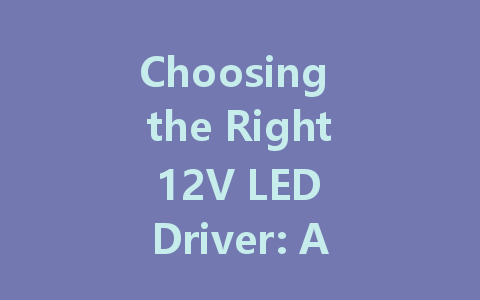In the world of lighting technology, LED drivers play a crucial role in ensuring that your LED lights function efficiently and effectively. If you’re looking to power LED lights at 12 volts, understanding the different types of 12V LED drivers available can help you make an informed choice. This comprehensive guide will delve into the various aspects of 12V LED drivers, from types and specifications to installation tips and choosing the right one for your needs.
What is a 12V LED Driver?
A 12V LED driver is a power supply designed to convert input voltage into a steady, safe output voltage of 12 volts, specifically for operating LEDs. Unlike traditional incandescent bulbs that can operate directly from standard electrical outlet voltages, LEDs require a stable current to maintain consistent brightness and prevent damage. The LED driver ensures that the right voltage and current are supplied to the lights, enhancing their performance and longevity.
Types of 12V LED Drivers
When selecting a 12V LED driver, you’ll find various types available. Understanding each type can help you choose the right one for your specific requirements.
Controladores LED de tensión constante
Constant voltage drivers provide a steady output voltage (usually 12V or 24V) and are typically used in systems where the LED lights are connected in parallel. They are straightforward to use and commonly found in residential and commercial lighting applications.
Controladores LED de corriente constante
Constant current drivers are essential for LED lights that require a specific amount of current to function correctly. They automatically adjust the voltage delivered to the LEDs based on the load. This feature makes them ideal for applications such as LED strips, where maintaining consistent brightness across the full length is crucial.
Dimmable LED Drivers
If you want to have control over the brightness of your LED fixtures, consider a dimmable LED driver. These drivers feature compatibility with various dimming systems, allowing you to adjust light intensity based on your needs. Options include TRIAC and 0-10V dimmable drivers.
Key Specifications to Consider
When purchasing a 12V LED driver, you’ll encounter several specifications that are vital for ensuring compatibility with your LED lights:
Power Rating
The power rating, usually measured in watts (W), signifies the maximum output power the driver can handle. It’s essential to choose a driver that meets or exceeds the total wattage of your LED setup. For example, if you’re connecting multiple 12V LED strips totaling 60 watts, a 60W driver would suffice, but opting for one with a slightly higher rating will enhance reliability.
Eficacia
Look for LED drivers with high efficiency ratings. More efficient drivers convert more AC power to DC power, reducing energy loss and heat generation. This efficiency not only saves on energy bills but also contributes to a longer lifespan for both the driver and the LEDs.
Input Voltage Range
Verify that the driver can accept the input voltage from your power source. Most 12V LED drivers are designed for standard voltages, but variations exist. Drivers that can handle a wider input voltage range can adapt to different electrical systems, which is especially beneficial in diverse installations.
Installation Tips

Installing a 12V LED driver can be straightforward, but there are important guidelines to ensure safe and effective setup:
Read the Manual
Always begin by reading the manufacturer’s installation manual. This guide will provide specific instructions tailored for the driver model you are using.
Check Wiring Compatibility
Ensure that all wiring used in conjunction with the LED driver is compatible. Using the correct gauge wire based on the current, length, and application can prevent overheating and ensure optimal performance.
Ensure Proper Ventilation
Heat management is vital for the longevity of electronic components. Ensure the LED driver is installed in a well-ventilated area to minimize the risk of overheating. Avoid placing the driver in enclosed spaces without airflow.
Test the Setup
Once installed, test your LED setup to ensure everything is functioning correctly. Check for consistent brightness and flicker-free operation.
Elegir el conductor adecuado a sus necesidades
Ultimately, choosing the right 12V LED driver depends on your specific application. Consider the following factors:
Tipo de aplicación
Residential and commercial installations may have different requirements for lighting levels, dimming options, and efficiency. Analyze your project’s needs carefully.
Expansión futura
If you anticipate expanding your lighting setup in the future, it may be wise to opt for a driver with a higher power rating than your current needs.
Budget
While it’s important to stay within budget, consider the long-term savings associated with energy-efficient options and longer-lasting drivers. Investing in higher-quality drivers can yield better performance and lower overall costs over time.
Conclusión
Selecting the right 12V LED driver is crucial for the performance and longevity of your LED lights. By understanding the types of drivers available, their key specifications, and the installation processes, you can make informed decisions that suit your lighting needs. Whether you’re illuminating your home, office, or external spaces, the right LED driver will enhance your lighting experience, all while being energy efficient and reliable.